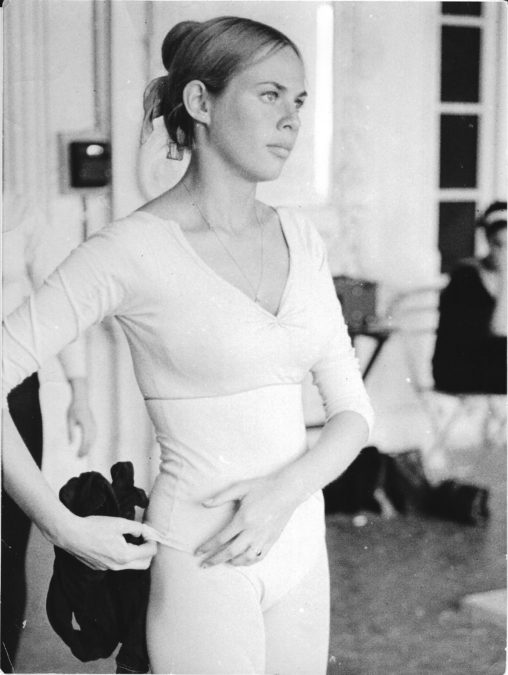I was fourteen years old when I left my home in Massachusetts and moved to Washington, D. C. My family didn’t come with me. My mother had scoped out a school on Wisconsin Avenue that offered ballet and academic subjects under the same roof, the first of its kind
in America. It was called The Washington School of Ballet. I was pursuing a serious ballet career and I’d been traveling back and forth for about an hour each way from Worcester to Boston four times a week for classes. I needed to find an easier way to train so my mother wrote to them, they talked on the phone and they offered me a scholarship.
Many of the students there lived at home in D. C. but I was in smaller group of girls from out of town. There was supposedly a house mother who was meant to watch over us but I rarely saw her. I had hoped my mother would stay with me for a few weeks when I got there so I could adjust, but I guess the idea of being on her own in a strange and busy city was too scary for her. As a result, there was no one to help me with my homework. There was no one to comfort me, so my father bought me a goldfish.
When my parents said good-bye to me and left that first afternoon, I stood in the middle of my small room in a women’s housing complex called McLean Gardens, staring at my goldfish, unsure what to do with myself. I was grateful my parents were letting me follow my dream, but fourteen is a pretty young age to face life’s challenges without being supervised.
I fell into a routine that made me feel safe. Each day, I got up, said good morning to Goldie, tapped food into her bowl and watched her swim around. She looked pretty lonely herself. I went to the cafeteria for breakfast, packed my dance bag, crossed the street to the
school, took a ballet class, changed out of my sweaty leotard and tights into my gray school uniform, and went to math and French classes. After lunch we had another ballet class and then we did English and geography and science. In the evening, I washed out my dance clothes in the sink, hung them on a wooden dryer
rack, sewed new pink ribbons on my pointe shoes, did my homework (math was difficult for me) and I fell into bed. It didn’t matter that I wasn’t being watched over. I was too exhausted to get into any trouble.
The loneliness was extreme and I cried every morning. I remember feeling ashamed of that. I hadn’t seen the other girls crying but they hadn’t seen me either. So I did the bootstrap thing, pretending I was okay as I wiped my eyes, left my room, straightened my spine, walked steady and kept my head down. The only time I felt okay was in ballet class.
I wrote a heartfelt letter to my mother every day, mailed it, and she corrected my English with a red marker, used the word correctly in a sentence, (she was an English teacher) and sent the letter back to me. Two years later, when I moved from D.C. to Manhattan, I was
a great speller, a learned grammarian, a highly trained ballet dancer and a lonely young girl with a broken heart.
Childhood wounds never go away entirely but we can learn to manage them. We can pick and choose with whom we discuss these very sensitive topics so we don’t feel shamed about what scares us. The idea is to get connected, not disconnected, and talking things over with a kind and compassionate person can help a lot. It can make you see that you’re not alone.
I attended a spiritual gathering once and the wildly famous drummer from that wildly famous Liverpool band, the Fab Four, spoke. “We’re all lonely here,” he said, “but we can’t tell that to everybody we meet.
When I pick up the dry cleaning and the woman behind the register asks me how I am, I can’t moan at her, ‘I’m lonely.’”
Apparently, even rock stars get lonely and like us, they don’t want to talk about it. I know I’ll never heal my loneliness because it’s been deep seated since I was fourteen and it isn’t a disease. It’s the human condition. Whether you’re madly famous or almost famous, married, single, have thousands of followers or shun social media altogether, we are all members of The Lonely Heart’s Club and we’re all trying to fill the gap. We do it with spirituality, art, writing, painting, watching TV, texting, volunteering or listening to a friend. These things give us short reprieves, suspended moments of grace when we forget about ourselves and our feelings and place our focus on
someone or something outside ourselves. But like a boomerang, no matter how far we throw it, the loneliness always finds its way back.
After all these years of trying to exile, abandon and throw loneliness aside, I’ve learned to accept it. It’s become clear that whether I try to snub it, eat through it, drown it, drug it, shoot
it, burn it up, run the car over it, steamroll it or fly it to the moon, it
isn’t going anywhere for very long. Resilient as a cockroach, it always comes back, ever faithful, and no amount of praying, meditating, breathing or having sex will banish it forever. I’ve learned to make friends with it and see it like an annoying uncle or cousin who corners you, talks your head off at a family gathering and you can’t seem to get away. As uncomfortable and unrelenting being lonely is, it’s perfectly safe. It won’t kill me. But trying to find a way
to eradicate it just might.


Recent Comments